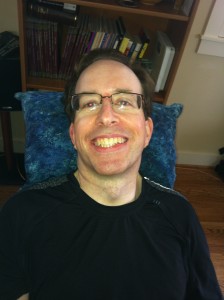Searching for hope on the horizon
 Clinical research participants have myriad motivations. They seek relief from pain. They want to help future generations. They want to fight back against their diseases.
Clinical research participants have myriad motivations. They seek relief from pain. They want to help future generations. They want to fight back against their diseases.
Jonathan Sari says his reason for participating in clinical research is more fundamental: it is his only hope.
Jonathan, a video game developer, first realized something was wrong on a beautiful summer day in 2003 at the age of 33. He’d taken a short hike with friends near his home in Walnut Creek, California, when his legs gave out beneath him.
“I couldn’t stand,” he recalls. “It wasn’t as if my legs were just tired or my muscles were sore. My legs wouldn’t hold me. I fell down and couldn’t stand up until I had rested. It was clear something was wrong.”
Doctors conducted numerous tests, but it was more than a year before Jonathan was diagnosed with multiple sclerosis (MS), a disease in which the immune system attacks the myelin sheath and nerve fibers of the central nervous system. Over time Jonathan’s condition steadily deteriorated despite medication. It became apparent his disease was not following the typical relapsing–remitting pattern of MS, but the far less common primary-progressive course.
Because, he says, “there are no really good mediations for progressive MS right now and the medications out there have really problematic side effects,” Jonathan was eager to participate in clinical research. Unfortunately, most MS research is directed at the relapsing-remitting variation. What’s more progressive MS is difficult to study. Because the rate of decline can differ dramatically from one individual to the next, researchers must study a large group of patients to establish whether or not an investigative treatment has slowed the disease’s progression.
Still, Jonathan has sought out trials where ever he can. He participated in a 10-year longitudinal study to identify genetic markers of the disease and in two trials studying investigative treatments.
The first trial was a placebo-controlled study investigating the effectiveness of fingolimod, a drug used to treat people with relapsing-remitting MS. For almost a year Jonathan underwent frequent MRIs, physical tests to determine his strength and coordination, and cognitive tests to assess his brain function, but he ultimately withdrew from the trial because his condition continued to deteriorate. He still doesn’t know whether he received the investigative drug or the placebo.
Roughly a year later he signed up for a Phase 1 trial that was attempting to regrow myelin, the fatty material that insulates nerves and enables them to conduct impulses between the brain and different parts of the body. Jonathan received a one-time IV infusion of a new antibody. Because he was one of the first participants to undergo the treatment, the dosage was very low and researchers monitored his reaction around the clock for 48 hours.
While participating in the earliest stage of human research might give some pause, Jonathan embraced the opportunity and hopes to participate in future research that might involve myelin regrowth. He is also on a long waiting list to participate in a stem cell trial.
For him, clinical research is life.
“I was excited and glad to participate,” he says. “It’s quite hard to find trials for progressive MS and because my disease has progressed so far, I’m not a candidate for most trials,” he says candidly.
Today, Jonathan lives in Seattle. He is confined to a wheelchair having lost functional movement in his legs and hands. If he wants to be heard he must rely on a ventilator. He knows time and his disease are working against him, and so he continues to search for clinical trials that may help him slow their relentless progression.
“I just wish we could simplify and streamline the process for getting these trials done. I only have so much time left,” he says. “For me it’s a race against the disease.”
If you are a patient interested in sharing your clinical research experience, please contact us.
